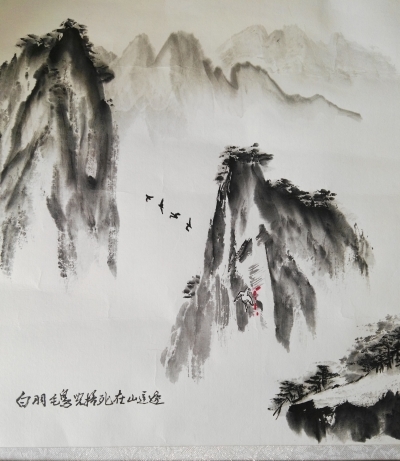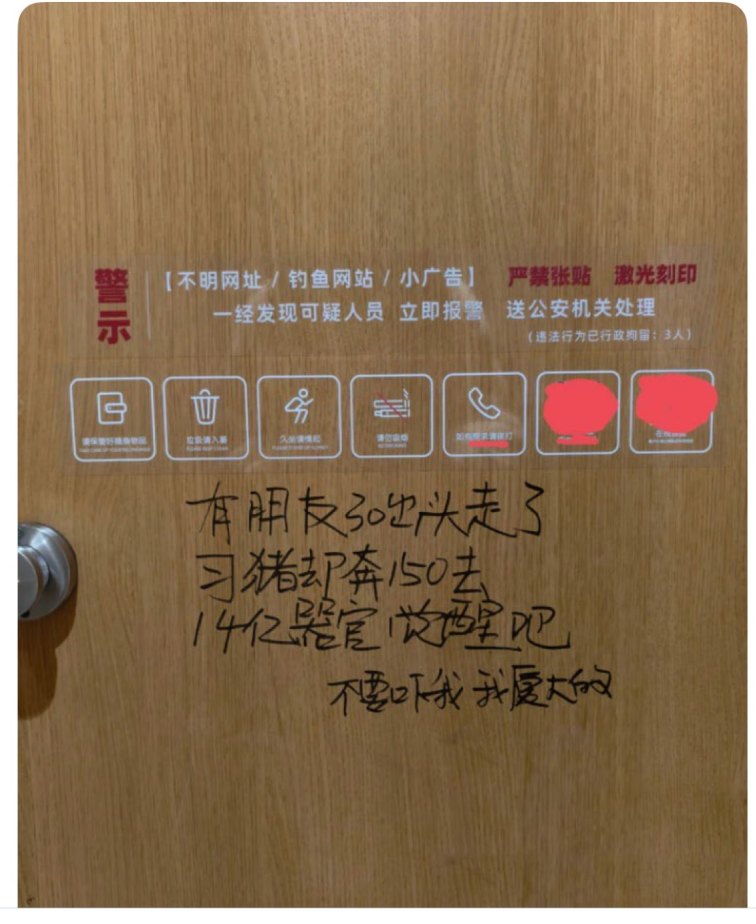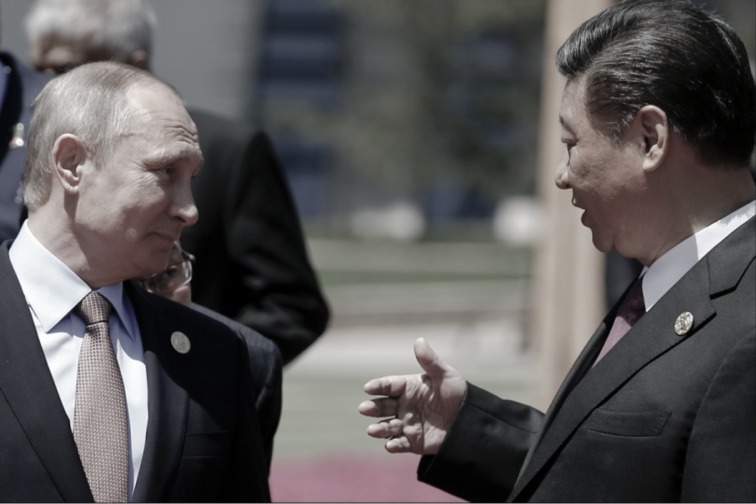Dark clouds loom over Beijing’s Tiananmen Square. (Feng Li/Getty Images)
[People News] At the September 3 military parade, Xi Jinping had intended to use the occasion to showcase himself. Yet unexpectedly, his private conversation with Vladimir Putin was overheard worldwide—topics like “organ transplants” and “living to 150” became the focus of international discussion. Reportedly, Xi’s blunder led to harsh criticism within the Party. On September 17, Xi Jinping attended the summary conference of the 80th Anniversary of the Victory of the War of Resistance Against Japan. During CCTV’s news broadcast of the event, something very unusual happened: the footage included a shot of Xi Jinping leaving the venue. At the same time, a history book banned in 2023, Chongzhen: The Diligent but Doomed Monarch, has resurfaced on online bookstores. Back then, public opinion widely believed it was pulled because the book used Emperor Chongzhen as an allegory for Xi Jinping, offending the “supreme leader.” With the Fourth Plenum approaching, it is clear that fierce internal struggles continue to roil the CCP’s top ranks.
According to CCP state media, on the morning of September 17, a summary conference for the 80th anniversary commemorations was held in the Great Hall of the People. Xi Jinping met with representatives of the organising committee, accompanied by Politburo Standing Committee member and event leadership group head Cai Qi, as well as deputy heads Wang Yi, Yin Li, Li Shulei, Zhang Youxia, Wang Xiaohong, Wu Zhenglong, and Liu Zhenli. Cai Qi delivered the speech at the subsequent meeting.
What drew attention, however, were several abnormalities in CCTV’s Xinwen Lianbo coverage. Since footage from the 2015 summary conference of the 70th anniversary is unavailable online, we instead compare it to the video of the October 16, 2019, summary conference for the PRC’s 70th anniversary celebrations.
First: Xi was not given special prominence
The first frame of the CCTV video shows Xi Jinping appearing together with other senior officials, then shaking hands with representatives. At the end of the handshake session, every shot placed Xi among other leaders—no solo close-ups, no attempt to highlight him.
By contrast, in 2019, the broadcast began with Xi Jinping alone in frame. After several seconds of close-ups as he shook hands, only then did the other Standing Committee members appear. Clearly, that earlier coverage conformed with Xi’s “supreme leader” status. Why the change now?
Second: Less than two minutes of handshakes
This time, the handshake footage of Xi and the officials with representatives lasted under two minutes. In 2019, the equivalent footage ran nearly three minutes. This explains why the total news segment this year was more than a minute shorter. Deliberately shortening Xi’s screen time—what does that signify?
Third: The special framing of Zhang Youxia
Most striking is Vice Chairman of the Central Military Commission, Zhang Youxia. In the handshake shots, Zhang appears in every frame, often quite clearly, even though he was separated from Xi by Cai Qi, Wang Yi, Yin Li, and Li Shulei. Was this deliberate positioning?
Fourth: Xi’s “exit” shot
The most bizarre of all: this year, after the group photo, CCTV aired footage of Xi Jinping leaving the venue. At that moment, Cai Qi, Wang Yi, Yin Li and others clapped while following him out. In 2019, no such footage existed—the broadcast cut straight from the group photo to Wang Huning’s speech.
Even more interesting, as Xi exited, Zhang Youxia was seen conversing with someone next to him. He noticed Xi leaving, yet unlike the others he did not clap and follow. Instead, he stood motionless, merely giving a token clap with his hands. What does this suggest?
Earlier signs had already indicated that real control of the military rests with Zhang Youxia, backed by Party elders. Recently, Zhang’s speeches—though superficially mentioning “Chairman Xi”—have in fact downplayed Xi Jinping. He has avoided invoking the “Chairman's responsibility system” and, at times, seemed dismissive.
For example, at the September 10 award ceremony for the Shenzhou-18 and Shenzhou-19 astronauts in Beijing, Zhang Youxia did not mention Xi Jinping’s “care for space exploration” and offered no pledges of loyalty, as if disregarding the authority of the CMC Chairman.
At the September 3 parade, Zhang stood in the first row on Tiananmen’s rostrum alongside Politburo Standing Committee members, appearing prominently in state media coverage—a highly unusual privilege.
Now, with CCTV broadcasting Xi Jinping’s exit shot, could it be sending a signal that Xi’s real departure may not be far away? Every report by the CCP state media undergoes strict vetting. Words and images carry heavy political meaning, especially when they involve the Party’s top leader. For such a shot to be aired is bound to stir speculation.
As with all CCP black-box politics, outsiders can only interpret from such subtle clues. Recently, the banned book Chongzhen: The Diligent but Doomed Monarch has resurfaced for sale. This, too, may be another powerful signal.
Columnist Zhou Xiaohui revealed on September 16 that, according to information from mainland China, recently—under circumstances not entirely clear—many banned books have begun reappearing for sale on mainland websites. Among them is Chongzhen: The Diligent but Doomed Monarch, which had been pulled from shelves two years ago.
The book’s earlier incarnation, titled Stories of Chongzhen—The Final Picture of the Ming Empire, was first published in 2016 by the Forbidden City Press. At that time, it caused no stir and drew no controversy.
On May 31, 2023, after the death of its author, Professor Chen Wutong, the work was reissued with a new title and cover design. On October 16 that same year, however, all major online platforms, Xinhua bookstores, and private distributors on the mainland suddenly received notice instructing them to remove Chongzhen: The Diligent but Doomed Monarch from sale and process returns. The official reason given was “printing problems.”
That explanation was widely disbelieved. In reality, many on Chinese social media had already been sharing the book’s cover image. What was so sensitive about it?
First, the title itself: Chongzhen: The Diligent but Doomed Monarch. Was this referring only to Emperor Chongzhen?
Second, the promotional tagline printed on the cover read: Blunder after blunder, misstep after misstep—the more “diligent,” the faster the downfall! Netizens exclaimed: Isn’t this the perfect reflection of today’s 'Supreme Leader”?
Finally, the cover design featured a rope hanging down from the first character of “Chongzhen” (崇). Wouldn’t “the One” (Xi) fly into a rage at such imagery?
According to the book’s author, Professor Chen Wutong, a consultant to the Chinese Ming History Society and a specially appointed professor at Beijing Normal University, the work is “rigorously researched, elegantly written, and brings readers back to the turbulent late Ming era, showing how Chongzhen brought about the dynasty’s downfall.”
“Chongzhen” was the reign title of Ming’s last emperor, Zhu Youjian (the Chongzhen Emperor). In 1644, when Li Zicheng’s forces captured Beijing, the emperor killed several of his consorts before climbing to the Inner Court’s hill (now Jingshan Park) and hanging himself alongside his loyal eunuch Wang Cheng’en. With his death, the 276-year-long Ming dynasty came to an end.
So how exactly did Chongzhen “lose his country”? The book’s introduction explains: he sought to enrich the state, but diverted wealth for his own purposes while ignoring military shortfalls; he wanted to strengthen the army, but imposed new taxes that ruined the people; he tried to end factional strife, but instead fueled it through favoritism; he was cautious in appointments, but suspicious and changeable, ultimately executing the capable general Yuan Chonghuan. Through its analysis of finance, factional politics, military affairs, and personnel choices, the book shows how the Chongzhen Emperor, step by step, drove himself to a dead end.
At the time, public opinion widely interpreted the book’s portrayal of Chongzhen’s failings as an allegory for Xi Jinping’s governing style. Since Xi took office, his policies have created both domestic and international crises, prompting many observers to naturally compare him with Chongzhen.
Indeed, Xi and the Chongzhen Emperor share many parallels.
Like Chongzhen, Xi has misjudged personnel, listening to the manipulative Jiang-faction courtier Wang Huning and choosing to “preserve the Party” at all costs. He has adopted a hardline foreign stance toward the U.S. and others, making one blunder after another. He amended the constitution, broke Party rules, and seeks indefinite re-election. His appointees are all loyal yes-men; Xi insists on “personally” directing everything, working incessantly.
In his third term, treacherous courtiers prevail, officials are disheartened and disloyal, and many merely “lie flat” and do nothing. Xi trusts fewer and fewer people, while undercurrents within the Party intensify. At the same time, economic collapse looms, social unrest is frequent, and public discontent grows louder. Calls of “Down with the Communist Party!” and “Xi Jinping step down!” can be heard across the country.
Externally, the situation is also dire. Xi’s “wolf-warrior diplomacy” has pushed Western nations to accelerate decoupling from China in economics, technology, and more.
Meanwhile, natural disasters and ominous signs abound—seen by many as Heaven’s repeated warnings. Among the people, talk spreads of Xi’s downfall, bringing about the CCP’s demise.
Precisely because Xi and Chongzhen have so many similarities, the public inevitably draws comparisons. Thus, banning Chongzhen was unavoidable, reflecting Xi and his followers’ inner weakness.
On September 16, Dajiyuan reporters confirmed that both Chongzhen: The Diligent but Doomed Monarch and its companion volume The Biography of Chongzhen have been restored to sale at many mainland online bookstores. The cover still carries the slogan: Blunder after blunder, misstep after misstep—the more diligent, the faster the downfall!
At a time when rumours swirl about Xi Jinping’s deteriorating health, strokes, and power slipping from his hands, the reappearance of this book—an allegory of Xi’s fate—on the market is itself a political weathervane. Is some faction behind the scenes sending a warning to Xi’s camp?
Let us take a look at the current state of China’s economy under the “supreme leader” Xi Jinping, who personally micromanages affairs with tireless “diligence.”
According to data released by China’s National Bureau of Statistics for August, growth across multiple economic indicators has slowed. The housing market, unemployment, and deflation all show no signs of improvement—pointing to signs of a “summer slump.”
In addition to a sharp contraction in foreign trade, China’s August consumer price index (CPI) fell 0.4% year-on-year, lower than expected, deepening the shadow of deflation.
Meanwhile, the national urban unemployment rate for 16- to 24-year-olds (excluding students) rose from 17.8% in July to 18.9% in August—a new high since changes in statistical methods 20 months ago. Previously, youth unemployment had exceeded 20% for three consecutive months (April–June 2023), peaking at 21.3% in June, the highest ever recorded. Shortly thereafter, the CCP abruptly suspended the release of youth unemployment data.
What is even more despairing is that first-tier cities such as Shanghai, Beijing, Guangzhou, and Shenzhen—once the engines of China’s economy—are not only losing their leadership role but are nearly at the bottom. In real life, a wave of “extreme low consumption” is sweeping across these first-tier cities in 2025. As the “canary in the coal mine” of China’s economy, the reaction of first-tier cities serves as a barometer of economic health. Signs of decline first appear in the most sensitive sectors before reaching the least sensitive peripheries.
The real estate sector, once the pillar of China’s economy, has now completely collapsed. Even Beijing, with its supposed political guarantees, has inevitably entered the garbage era of its property market.
In August 2025, even after the removal of purchase restrictions, only 3,135 new homes were sold in Beijing. Compared with 5,308 units sold in August 2024, that is 2,173 fewer—a year-on-year plunge of 40.93%.
Zhou Min, senior China economist at Mizuho Securities, told Liberty Times Finance that China’s economic growth may slow even more sharply in the fourth quarter. Without major stimulus measures, the CCP government’s 5% growth target will be difficult to achieve.
Facing China’s deep structural problems and a bleak outlook for economic recovery, all of Xi Jinping’s previously introduced measures to boost consumption, rescue the real estate sector, and increase employment have failed. What other strategies does Xi have left?
We now see in recent days a flurry of U.S.–China interactions. On September 9, PRC Defence Minister Dong Jun held a video call with U.S. Defence Secretary Pete Hegseth. On September 10, U.S. Secretary of State Marco Rubio spoke by phone with PRC Foreign Minister Wang Yi. On September 15, PRC Vice Premier He Lifeng met U.S. Treasury Secretary Scott Bessent in Madrid, after which the two sides announced a framework agreement on TikTok. Chinese Premier Li Qiang is scheduled to attend the United Nations General Assembly in September and hopes to meet senior U.S. officials there, aiming to pave the way for a Trump visit to China.
Foreign media analysis suggests that all these moves by CCP officials serve one goal: lobbying for Donald Trump to visit China.
According to BBC Chinese, Dr Patricia Kim, a research fellow at the Brookings Institution’s China Centre, pointed out that Xi Jinping does not wish for relations with the U.S. to completely collapse, as that would bring severe economic and political risks. Analysts also believe that Beijing will try to welcome the U.S. with a “grand ceremony and big orders.”
Previously, Xi and other CCP leaders adopted harsh rhetoric toward the U.S. Why is it that Xi no longer dares to talk tough now? From CCTV’s signal of Xi “exiting the stage,” to the resurrection of the banned book Chongzhen, signs that the Xi era is coming to an end appear to be emerging. △











News magazine bootstrap themes!
I like this themes, fast loading and look profesional
Thank you Carlos!
You're welcome!
Please support me with give positive rating!
Yes Sure!